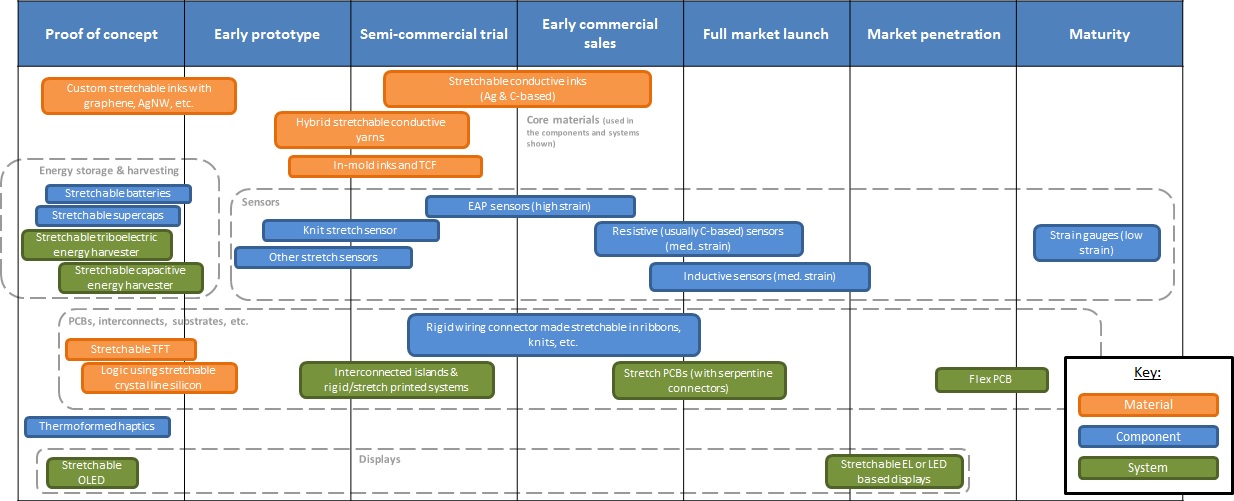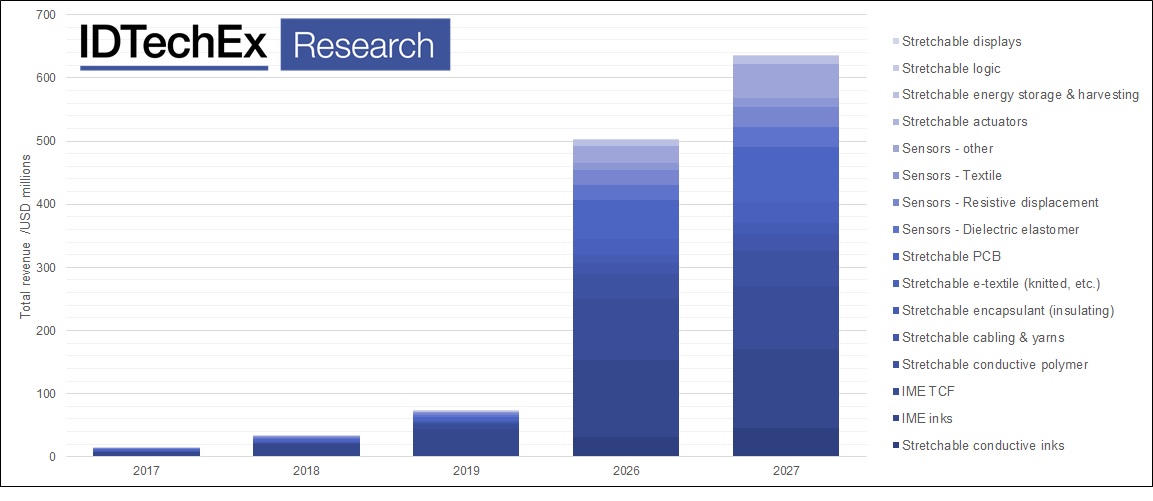Stretchable electronics: Out of the lab and into the market
Whilst the latest electronic components continue to push the boundaries of performance, there are many that now see Moore's Law reaching its ultimate limits. Electronic devices continue to achieve increasing levels of ubiquity, but for this to continue, electronics need new form factors in order to integrate seamlessly into our surroundings.
Author: James Hayward, Senior Technology Analyst, IDTechEx
IDTechEx Research's brand new report, Stretchable Electronics 2017 - 2027, summarises all of the most important information with regards to the commercialisation of stretchable electronics. This major paradigm shift towards novel form factors has been in the making for more than a decade now, yet is only now beginning to make a substantial commercial impact.
The report covers all stretchable electronic materials and components that are either commercial today, or are approaching commercialisation within the next decade. This ranges from established growing markets (various sensor types, circuit boards and other stretchable connectors and cabling, etc.), to new emerging markets (stretchable examples of conductive inks, TCF and e-textiles, relevant substrates for each, other sensors including smart skins, in-mold electronics, etc.) and finally to long-term projects in stretchable electronics which remain largely academic today but will become more important with time (energy storage and harvesting solutions, new sensor types, displays, transistors and more).
Technology readiness for stretchable electronic components. Click image to enlarge.
In the last few years there has been a significant influx of commercial players introducing new stretchable electronic products to the market. Most of these new commercial examples have presented material and component options that will find their way into new stretchable products in the coming years. With detailed ten year forecasts for ten different component types and pooled data from 32 different product types, the report offers the most comprehensive overview of stretchable electronic offerings today, leveraging IDTechEx's extensive work over the last decade.
These stretchable electronic components will form the basis of new products across a series of industries. In some cases, these products will be novel, as stretchability enables electronics to go where they have not been present before. This could be part of skin patches, surgical catheter, within a compression garment or bandage or as a smart skin or novel end effector for a robot. In other cases, stretchable electronics will enhance our existing products, enabling us to add to existing electronic functionality and improve its utility. This could be as an extension to an existing medical device, or a new one in a hospital bedsheet or gown, as a console in a vehicle or in white goods or as other structural electronics, examples of which are beginning to appear today. The report forecasts pool data from 32 product types into six different categories and five different vertical markets.
Forecast summary showing 16 separate component types from 2017-2027. Click image to enlarge.
This report has been compiled and summarised over many years at IDTechEx. With active coverage of industries including conductive inks, TCFs, e-textiles, sensors, printed and flexible electronics, displays, energy storage and harvesting, IDTechEx's analysts have had the opportunity to compile the state of the art in stretchable and flexible examples from each of these sectors. This is the only report which offers both a breadth of coverage, but also an extensive collection of first-hand primary research. Specifically, the report contains primary research from 59 separate companies, including photographs, site visits, conference visits and telephone interviews, as well as detailed information of over 100 organisations, both academic and commercial.
This report is the essential guide to any company that is active, interested or competing directly within the electronics space as a whole. New form factors are already entering the market as peripheral devices (e.g. sensors or as connectors between rigid components), but will increasingly reach mainstream applications and products. This report provides a detailed roadmap towards the likely commercial situation in a decade, and infers relative growth rates and opportunity beyond this.












